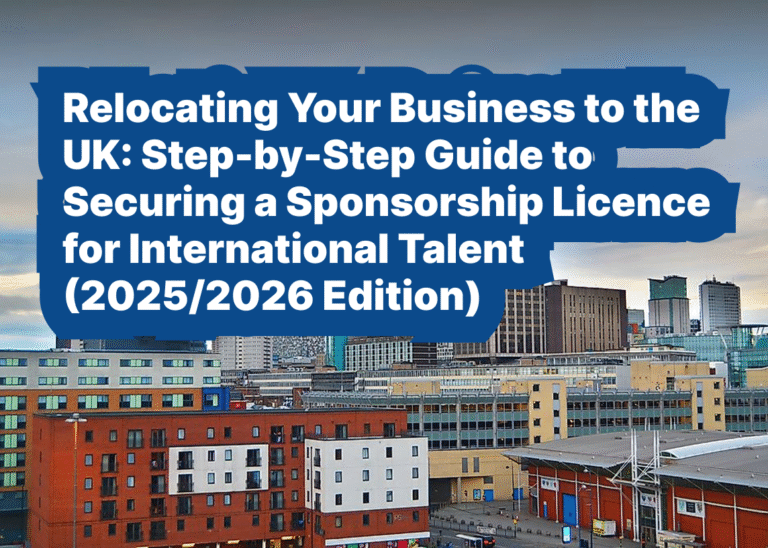For international students considering studying in the United Kingdom, the decision extends far beyond selecting a course and university. The UK student visa opens doors not only to world-class education but also to a structured pathway toward indefinite leave to remain (ILR)—permanent residency status. Understanding how your student visa experience can transition into long-term visa sponsorship and ultimately lead to permanent settlement is crucial for making an informed decision about your future.
The UK Student Visa: Your Foundation
The Student visa category allows international students to study full-time at recognized UK institutions. As of recent changes, the system has become increasingly favorable for those seeking to extend their stay beyond their studies. The Student visa itself does not directly lead to permanent residency, but it serves as the essential first step in a strategic immigration pathway.
When you obtain a Student visa, you’re not simply gaining access to education—you’re entering a defined immigration route with specific provisions designed to facilitate progression toward settlement. The visa typically allows you to study at your chosen level, from undergraduate through postgraduate qualifications, and includes limited work rights that can enhance your professional development while studying.
The key distinction in the current system is that Student visa time now counts toward the 10-year continuous residence requirement for Indefinite Leave to Remain, making it a valuable component of your long-term settlement strategy. This change fundamentally altered how international students should view their educational investment in the UK.
Understanding ILR and the 3 to 5 Year Route
Indefinite Leave to Remain represents a form of permanent residency that grants you the right to live, work, and study in the UK without requiring a sponsored visa. Rather than being tied to a specific employer or visa category, ILR provides genuine security and freedom in your immigration status.
The pathway to ILR has been reorganized under recent immigration reforms. For most individuals moving from Student status, the typical route involves transitioning to a Skilled Worker visa after completing studies. Here’s where the timeline becomes strategically important: your years as a Student visa holder count toward your overall residence period, meaning you can reach ILR eligibility in as little as three to five years total, depending on how you structure your progression.
If you study a master’s degree lasting one year, followed by a Skilled Worker visa sponsorship position, you could potentially reach ILR eligibility within five years. Some individuals pursuing longer undergraduate courses or multiple qualifications might reach this milestone in as little as three years from their initial Student visa start date. This accelerated timeline compared to historical frameworks makes the student visa route increasingly attractive for those planning long-term UK settlement.
The Critical Transition: From Student to Skilled Worker Visa
The pathway from Student status to permanent settlement hinges on successfully transitioning to a Skilled Worker visa. This represents the crucial juncture where your education must convert into employment opportunity.
The Skilled Worker visa requires an employer willing to sponsor your application. This is where your choice of university, field of study, and professional development during your Student visa period become strategically vital. Employers are significantly more likely to sponsor visa applications for candidates who’ve completed UK qualifications, particularly postgraduate degrees from recognized institutions, as they’ve already demonstrated commitment to the UK job market and adapted to British professional culture.
During your Student visa period, you have limited work rights allowing you to gain practical experience in your field. This experience becomes invaluable when seeking employer sponsorship. Students who’ve worked in relevant roles, built professional networks, and developed industry-specific expertise are substantially more attractive to employers considering visa sponsorship.
The skills shortage framework further supports this transition. If your field—such as technology, engineering, healthcare, research, or finance—experiences documented skills shortages, employers have additional incentives to hire and sponsor international graduates. Your UK qualifications combined with demonstrated capability in these sectors make you an ideal sponsorship candidate.
Strategic Planning During Your Studies
Your success in securing employer sponsorship begins long before you graduate. The decisions you make during your Student visa period directly influence whether employers will invest in sponsoring your ongoing stay.
Actively building professional networks within the UK is fundamental. Attend industry events, connect with professionals in your field, engage with university careers services, and seek internships or part-time work opportunities aligned with your career goals. Many employers sponsor individuals they already know and have assessed firsthand, so workplace visibility during your studies can directly lead to sponsorship opportunities upon graduation.
Choosing your academic institution strategically matters more than many students realize. Universities with strong industry connections, particularly in your specific field, increase the likelihood of internship opportunities and employer recruitment on campus. Research-intensive institutions also develop reputations with specific employers, making graduate sponsorship more commonplace.
Selecting your course and specialization with both intellectual interest and career marketability in mind ensures your qualifications translate into roles that employers find worth sponsoring. Generic qualifications are harder to sponsor than specialized technical expertise—a postgraduate degree in a specific engineering discipline, cybersecurity, data science, or healthcare specialty makes a stronger sponsorship case than broader alternatives.
The Timeline Advantage: 3 to 5 Years to ILR
Consider a practical timeline that illustrates how quickly permanent residency becomes achievable:
A student completes a two-year master’s degree on a Student visa. Upon graduation, they secure employment with a sponsoring employer and transition to a Skilled Worker visa. After approximately three years in the Skilled Worker category, they become eligible for ILR. Total time to permanent residency: approximately five years from initial Student visa commencement.
Alternatively, a student completes a three-year undergraduate degree on a Student visa, immediately finds employment with visa sponsorship, and maintains Skilled Worker status for three years. Total time to permanent residency: approximately six years, though recent reforms mean ILR eligibility could potentially arrive sooner under certain circumstances.
Compare this to historical timelines when Student visa time didn’t count toward residence periods—the current system represents a fundamental acceleration of the settlement pathway. For individuals committed to UK-based careers, this accelerated timeline makes the initial education investment increasingly cost-effective.
Financial Considerations and Long-Term Value
The investment in a UK education becomes financially justified when viewed through the lens of permanent residency pathways. Tuition costs, while substantial, must be evaluated against the career and settlement benefits that flow from UK qualifications and subsequent employment.
Graduates with UK master’s degrees typically command higher starting salaries than international candidates without British qualifications, often recovering tuition costs within five to seven years of employment. Combined with the pathway to permanent residency—eliminating visa sponsorship uncertainties after five years—the financial case for UK education strengthens considerably.
Furthermore, ILR status eliminates ongoing visa sponsorship costs and complications, allowing you to change employment freely, increase earning potential through greater career mobility, and establish genuine financial security. For those planning long-term UK-based careers, the cost of education amortized over a career spanning decades represents an increasingly attractive investment.
Post-ILR Opportunities
Achieving ILR status opens additional pathways previously unavailable. With permanent residency secured, you gain the flexibility to establish your own business, access certain professional roles requiring permanent resident status, and pursue opportunities without employer sponsorship constraints.
Many individuals who’ve secured ILR subsequently pursue British citizenship, further solidifying their status and opening doors within the UK and European professional markets. The progression from Student visa through Skilled Worker sponsorship to ILR and ultimately citizenship represents a comprehensive integration pathway for those committed to building long-term UK lives and careers.
Navigating Current Requirements
Understanding current visa requirements is essential for successful navigation of this pathway. The Skilled Worker visa requires your role to be on the Shortage Occupation List or for your employer to meet immigration salary thresholds and other conditions. However, skilled graduate positions in high-demand fields increasingly meet these requirements, making sponsorship achievable for those with appropriate qualifications and experience.
Recent reforms have also introduced the concept of points-based immigration, allowing individuals to understand visa eligibility requirements more transparently. Your education qualifications contribute positively to this assessment, and combining UK qualifications with relevant work experience significantly strengthens your candidacy for sponsorship.
Making Your Strategic Decision
For ambitious professionals seeking to establish UK-based careers with the security of permanent residency, the combination of Student visa access and the accelerated ILR pathway represents a compelling opportunity. The three to five-year timeline to indefinite leave to remain transforms what might have been a temporary educational experience into a strategic pathway toward permanent settlement.
The crucial elements for success involve choosing your education carefully, maximizing professional development during your Student visa period, and actively positioning yourself for employer sponsorship. With disciplined planning and strategic decisions throughout your studies, the transition from international student to permanently settled professional becomes not merely possible but achievable within a surprisingly compact timeframe.
The UK Student visa is no longer simply a qualification route—it’s the gateway to comprehensive career and settlement opportunities for those prepared to leverage it strategically. For international students with long-term ambitions in the UK job market, understanding and planning for this pathway transforms the educational investment into a multi-faceted career and residency strategy that extends far beyond graduation day.






